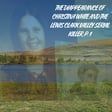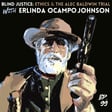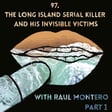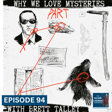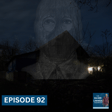Become a Creator today!Start creating today - Share your story with the world!
Start for free
00:00:00
00:00:01

75. The Scales of Jim Crow Injustice with Gilbert King of Boney Valley, Part 1
In this episode, Jayson sits down with Pulitzer Prize-winning journalist and historian Gilbert King. Gilbert shares his journey of uncovering dark and traumatic areas of American history, focusing on civil rights and wrongful convictions. They delve into his award-winning books, "Devil in the Grove" and "The Execution of Willie Francis," and discuss his podcast "Bone Valley," which raises questions about the justice system. Gilbert also reflects on the importance of self-care and the honor of telling forgotten stories.
Check out Gilbert's podcast, Bone Valley, here.
Visit our website and follow along with us on Instagram, join our Silver Linings Fireside Chat Facebook group and join us on Patreon.
Transcript
Journey of Storytelling and Curiosity
00:00:00
Speaker
Everything is a journey. I know that sounds kind of corny, but these cases never end for me. Even like the Willie Francis, every once in a while, I'll get an email from somebody who tells me something new and I'm really interested in it. It kind of ended this lifelong curiosity that just never stops. One of the things that people ask me, they didn't really ask me this 20 years ago, but it's very common now
00:00:23
Speaker
especially when I go to colleges and speak to young people, they say to me, you deal with these really dark, traumatic areas of history, and what do you do for your own self-care?
Self-Care in Storytelling
00:00:36
Speaker
And I remember never having an answer for that. I would just joke my way through it and go, oh, it's a couple of martinis. That's what gets me. That kind of stuff. And I didn't really have a good answer for that. And I remember I was hosting or moderating a conversation for the Dayton Literary Peace Prize, and one of the authors was Isabel Wilkerson.
00:00:53
Speaker
And so I said, you know what, I'm going to ask her the question because I need an answer for it. I'm going to ask her what she does for her own self care. Because I guarantee you, she'll have thought about this more than I have. And so I did ask her about that. And I just thought she just gave me the greatest answer in the world. And this one I've just absolutely stolen from her. I give credit for it. But you know, she said, these stories are my self care that someone's trusting me to use my platform to be able to like,
00:01:21
Speaker
investigate these stories and do the research and take care to give someone a voice and to tell a story that might otherwise have been completely forgotten.
Introducing Gilbert King
00:01:47
Speaker
A journalist and historian and the author of two award-winning books on civil rights and the host of the podcast, Bone Valley. This is the Silver Linings Handbook podcast. I'm Jason Blair. Gilbert King is a journalist who's the author and the winner of the 2013 Pulitzer Prize for general nonfiction for his book, Devil in the Grove, Thurgood Marshall, The Groveland Boys, and the Dawn of a New America.
00:02:17
Speaker
That book tells the story of Jim Crow-era central Florida in the 1940s and early 1950s, where citrus barons had become rich off the backs of cheap black labor. In Lake County, a central Florida clowny about 40 miles away from where Walt Disney World would be built 20 years later, people could stare out over vast landscapes filled with orange trees that stretched as far as the eye could see.
00:02:47
Speaker
There, when a 17-year-old Groveland, Florida girl said she was raped, the ruthless sheriff began the hunt for four local black boys who had dreams of something greater than the orange trees.
The Groveland Boys Case
00:03:01
Speaker
By the end of the day, members of the second Ku Klux Klan swept into town, burning homes of blacks and chasing hundreds into the green swamp.
00:03:11
Speaker
Soon, future Supreme Court Justice Thurgood Marshall, a young NAACP lawyer at the time, began what turned into a near suicidal mission to fight the Klan and find justice for the boys.
00:03:26
Speaker
Gilbert returned to Lake County, Florida to write about the December 1957 case of the wife of a wealthy Florida citrus baron being raped in the investigation by the same racist sheriff who is involved in the Groveland Boys case, Willis McCall. That book uncovered questionable incarceration without trial of Jesse Daniels, a mentally impaired white teenager. That turned into the book
00:03:56
Speaker
beneath the ruthless sun.
Civil Rights Injustices and Bone Valley
00:03:58
Speaker
Gilbert's earlier book, The Execution of Willie Francis, Race, Murder, and the Search for Justice in the American South, explores the life and death of Francis, who was electrocuted in 1947 at the tender age of 18, and who survived that first electrocution, and his case made it to the US Supreme Court before he was executed
00:04:23
Speaker
Gilbert has been known more recently for his work as the host of the podcast Bone Valley, where Gilbert and his talented producer, Kelsey Decker, explore the life of Leo Schofield Jr., who was convicted 35 years ago of the death of his wife, Michelle, and was recently given parole in a case where Gilbert and Kelsey
00:04:43
Speaker
raised serious questions about actual innocence. Gilbert, who now lives in Brooklyn, is a native of Rockville Center, New York on Long Island. He attended high school in upstate New York and Schenectady before heading to the University of South Florida in the Tampa area for college, where he left before graduating to return to New York. There, Gilbert worked as a freelance writer and an editor
00:05:10
Speaker
an assistant to the president and publisher of Macmillan Publishing, and as a photographer.
Gilbert King's Storytelling Journey
00:05:16
Speaker
Gilbert's writing has appeared in The New York Times, The Washington Post, Cosmopolitan, Harper's Bazaar, and Vogue. His photographs have appeared in Modern Bride, Jane, Glamour, and he's done work for Michael Kors, Leadrio, and other fashion houses.
00:05:34
Speaker
He has written and taken photographs for coffee table books and is ghost written for celebrities and experts. Today we're going to explore the case of Leo Schofield, but also take a deeper dive into Gilbert's work focused on civil rights and an America of the past that still resonates in effects today.
00:06:10
Speaker
So, Gilbert, I just wanted to thank you for joining today and then tell you a little bit of a story about how I first came across your work.
Impact of King's Work on Jason Blair
00:06:20
Speaker
I grew up in the Washington, DC area, Georgia, Texas, a bunch of other places.
00:06:29
Speaker
you know, I've always been deeply my parents, you know, my dad's family's from the low country of South Carolina. My mom's from the northern Nick of Virginia. So, you know, southern things, civil rights things have always been on my mind. And I was having a conversation with a friend about the changing Supreme Court. This is while I probably win. I'm probably Anthony Kennedy was coming off the quarter at some some point like
00:06:59
Speaker
Oh, yeah. Yeah. And we were talking about the different justices, the ones that stood out. Marshall was one of them. And I was on with a friend who was a journalist. He had been at the Times and Newsday and other places like that. And he's like, you know, have you read the book Devil in the Grove? And I was like, no, I've never heard of it. And he said, oh, it's by this guy, Gilbert King. You should really read it. It's about Thurgood Marshall. And he's like, and you should check out this chapter where we almost lost him.
00:07:27
Speaker
And I was like, what do you mean we almost lost him? And he was telling me, you know, we were inches away from never having a Thurgood Marshall. So I thought, I have read a ton about this guy and I've never heard this particular story. And I grabbed the book and I was engrossed, not just because it told a Marshall story, but also the story of the boys that were there, but also what I really loved about it.
00:07:56
Speaker
It told the scene of what was happening in a period of Florida history that I didn't really know or understand.
00:08:06
Speaker
the citrus barons, all the things when we talk about race and why certain things happen, really to be wrapped the context of the time around it. And I think that that helps us understand what's happened in our past. But it also gives us a roadmap when we can see those parallels in our present or potentially in our future to not create the same
00:08:34
Speaker
So I was moved by it and then went backwards and read your book about from the execution of Willie Francis. And so I was a huge fan. And then when Brett and Alice from the prosecutors had you on, I was like, wow, guys, you have my hero. Could you please ask six questions for me?
00:08:56
Speaker
It is. Yeah. And I know they were so excited to have you on it. And it was so neat to see how excited you were to be on. I'm like, we're all excited about each other. No, I really love, you know, these kind of conversations are just so much fun, you know, to just someone who's like, I read the book a while ago and can't believe, you know, we're going to have this conversation now. I just love that stuff. So
00:09:21
Speaker
Yeah, I'm really happy to be here with you too. I've been listening to your podcast as well, and I've become like a podcast dude all of a sudden, so I have to pay attention to everything.
Podcasting vs. Book Writing
00:09:30
Speaker
Yeah, don't go in too deep into the podcast world. Yeah, I know the feeling. Well, yeah, and I think, you know, that just makes me think of something that sort of like, you know, depending on your medium,
00:09:45
Speaker
in certain mediums, you get a huge feedback loop from your listeners or readers. And in books, you don't always know how your work touches people. You know, yeah, put the book down. Yeah. You're absolutely right about that. I've never experienced anything like it. You know, like even when like devil and the girl started getting a lot of attention and it was getting in the news and they were, you know, moving towards pardons and exonerations.
00:10:11
Speaker
Is that the kind of feedback it was nothing like i mean granted it was a couple years ago, but it wasn't that long ago there was still social media was not yet twenty nineteen so, but it wasn't nearly what it was with the podcast like the podcast is immediate and it just seems like people listen to an episode and get on there and tell their friends and,
00:10:30
Speaker
Well you know just talk about it and it's just it was a different animal i've never experienced anything like it just not even be able to respond to all the messages that i get was like overwhelming to me cuz i really have always done that with the book you know people would write me. No emails and i would be able to answer these things you know it's not like i'm jk rallying you know. But but you know with the with the podcast i couldn't even keep up it was it was just something i would never never expected and.
00:10:59
Speaker
Really interesting though. That is something I wanted to ask you about. I know the thing that people are talking about in your work right now is the podcast Bone Valley, which covers the case of Leo Schofield, who was just recently released.
00:11:22
Speaker
What bone valley really does is it lays out a lot of questions about the case and a lot of questions about the trial and the evidence and you know the potential you know it lays out a strong case for
00:11:37
Speaker
for an alternative perpetrator. And as an author and someone who's written a number of books, I was curious why you didn't go first to writing a book as opposed to podcasts. I was curious about what about the medium sort of the Leo story there.
00:11:57
Speaker
That's a really nice question. I'm really glad you asked me that because this makes me go back and I've been thinking about this a lot lately. I remember when I first got it, it was when Judge Cupp gave me that card and I started getting curious and started reading the transcript and looking into newspaper coverage of it and just getting the basics. That took a while. I didn't really jump into it right away. I started trying to acquire more files, get things from the defense. They were giving me all the files.
00:12:28
Speaker
And I just realized that, you know, I just thought, well, this is very different from the other stuff I write, which is usually about race, history, law. I mean, granted, this was in the 1980s, so it was sort of history, but it just felt like more of.
00:12:42
Speaker
It felt more like a wrongful conviction story than something that was encompassing race and history. And so I just didn't see that it was going to fit the kind of book that I like to do. I really did feel like an allegiance to this pre-civil rights era of history, you know, right before the 60s when people just weren't really aware of the things that were happening in this era. And so I just, there's no shortage of these kinds of stories. I find them all the time. And I feel like I could spend the rest of my life doing those kinds of stories.
00:13:12
Speaker
But there was something about Bone Valley. I thought, you know, maybe I'll do like a feature article about it. You know, something like for the Marshall Project or maybe like New York Times Magazine about this really interesting case. And the more I started looking into it, I tend to get really obsessed with this and I could take a long time to get the research. And it soon became apparent that this was much more than even a long narrative. It had to be something else. And I wasn't really sold on doing a book on it yet.
00:13:41
Speaker
I was working with Kelsey who at the start was doing research for me, and she was the one that came up with the idea. It was right after we interviewed Leo. She'd been listening to a lot of podcasts, and we were just so blown away by the stories he was telling us the first time we met him over three or four hours.
00:14:00
Speaker
that she came out and said, we should do a podcast. I thought to myself, I'd listen to a couple and I thought, that's a really nice idea and everybody's still alive in the story. Usually, I'm always dealing with documents and nobody's the right story. A couple people maybe because they were really young, but for the most part, everyone's gone. You're really just trying to build these stories and narratives from documents and pellet briefs and transcripts.
00:14:27
Speaker
Which I like doing, it's kind of like a giant puzzle. But this one felt different, like everybody we looked into was still around, and as we started reaching out, they wanted to talk. And at that point, I said, yeah, let's just get really good quality tape. Let's do this. And so Kelsey had to become an audio engineer all of a sudden. Basically, we picked up some equipment, and she just kind of self-taught herself over YouTube and talked to some smart people. Yeah, and she just put it together pretty quick.
00:14:57
Speaker
We had to go through a lot of trial and error. I think you see this a lot with print people, print journalists going to podcasts. They're doing their interviews and they're just not used to it. They're used to doing it for books where you don't hear anything. But in podcasts, you have to learn to shut up and not keep saying, uh-huh, yeah, uh-huh. That took a while to learn. A couple of my early interviews were just awful because I was talking over everybody.
00:15:24
Speaker
Kelsey really taught me. She was studying all this stuff and she just used to hand me these little notes that said shut up. Everybody needs a Kelsey, I think. Exactly. Yeah, I definitely needed a Kelsey. That's for sure. She's so talented. One of my, I think, favorite moments in the podcast, which we can get into more, is the interview with Jeremy Scott that she so successfully got him to share so much.
00:15:54
Speaker
thought, ouch, she should be an interrogator or a counselor or maybe continue being a journalist. But I was really inspired. How did you guys meet? Yeah, I was working on a new book that I still have not finished. I've been doing research on it for many years now. But I would go to the Columbia Library at Columbia University. They have an oral history division where they have just all these tapes. And I was pulling out these like, you know,
00:16:23
Speaker
journalists that were just black journalists that were being interviewed. It sort of fit the story I was doing. I had a heavy journalism tilt. So I wanted to hear what black journalists were thinking about and talking about and just hearing these oral histories. She was working there. I think she had already just graduated from college and she only had a little more time left at the library. She was definitely smart, definitely interested in this stuff.
00:16:50
Speaker
I just asked her if she was interested in doing any research on the side and she said yes. She started doing some research for me on my book and then that was when I met Scott Cupp.
00:17:03
Speaker
That's the judge, the retired judge who approached you. You were giving a speech somewhere, is that right? Yeah, I was doing a judicial conference down in Naples, Florida. He was actually still on the bench at the time, which was really weird because I got that card. I'm like, there's no way that a judge is supposed to hand me a card with a case saying that this guy's innocent.
00:17:23
Speaker
You know, I kind of was surprised by it. I've never. Yeah, I've never heard of a time where I suspect if I pulled all the journalists, I know you may be the only one who's gotten a tip from a judge on the bench. Yeah, I've never had. I mean, there's all sorts of ethical things and like they're not allowed to comment on current cases. And in that case, still had an appeal pending. So it fit the description of a case that was still in progress.
00:17:52
Speaker
And he was not supposed to do that. And he just said, I don't care. This case has just been bothering me for decades. And, you know, somebody needs to do something with this because we're out of legal options, it seems like. And so I was, I was really surprised that he did that. I remember going to dinner like at night with a bunch of public defenders and I pulled out the cars like, what do you guys think of this? This is from a sitting judge. And every one of them was like, wait, a judge gave you this. He just, he just told you about this. Like that's, that violates the ethical canons.
00:18:20
Speaker
And they were passing it around. It wasn't until it got to a guy from Polk County, which is where the Leo Scolfi case took place. And he just said, I know this case. You should call him. And that kind of, you know, he, his guy knew all the cases. He'd been around forever. And I just got a look from him that said, you know, there's something wrong about this case. Call him. And, uh, sure enough, that's how it all started. But, um, you know, at that point, like Kelsey came on board and she, she was like,
00:18:48
Speaker
She knew more about the case than I did because she got ahead of me and she was reading police files and just going through all this stuff. And her, her mind is just, she retains everything. We, we called her the keeper of the facts because off the top of her head, she knew everything about the case. Um, and you know, this case started splintering into other cases with, you know, when Jeremy got involved and she was on top of all that. So she was like just absolutely invaluable. And I think the great thing about it is, you know, she started as a researcher.
00:19:18
Speaker
And you know, then she started getting more and more confidence and you know, she had no journalistic training. Neither of us really did to be honest with you. Um, she started going out and doing interviews by herself. One time she had to go to the prison by herself to interview Leo. And I think it's really interesting because he had a different way of talking to her when she was there. Like he just seemed more open and more like emotional.
00:19:44
Speaker
So some of the stuff that she got from that interview, I thought was really, really powerful. But, you know, I think, you know, the whole icing on the cake was what she was able to do with Jeremy Scott. I mean, she was sitting right next to him. I was sitting across the table from him and she was just sitting right next to him. And she was just, you know, asked these very gentle questions and he would turn to her and look in her eyes and he just started talking to her almost like he was at a therapist. And he just got very honest.
00:20:14
Speaker
very raw, very emotional. And I just said, wow, this is really, really working out really well. Um, because that's like the stuff I don't do. I don't really ask how are you feeling? Why does that make you feel? I don't really do that very often. That's like always been kind of Kelsey's thing, but it worked perfectly in this, in this interview.
00:20:31
Speaker
Were you in that moment sort of where he started to open up? What did it feel like for you? Were you shocked? Could you believe what you were hearing? Could you kind of connect what it meant as he was? Because that's the moment where you really start getting these details that really sort of strengthen the theory that he's involved. Yeah. What was that like?
00:21:00
Speaker
It was very surreal. I wasn't expecting him to go into things. I've listened to all his interviews that are taped. I've read all the transcripts. I really just studied this guy for months on end and just tried to figure things out about the way he talked, the patterns he talked, that sometimes you could tell when he was lying. He had a couple little tells that he would do. Also, we're dealing with someone who's IQ is a little less than 80.
00:21:28
Speaker
And so he's not like a master criminal. He has a hard time keeping things straight. He's had some brain damage from an early age. And so he's not the most sophisticated person. He dropped out of school, basically, in fourth grade. And so we had to take all that into consideration. And we studied him. And we saw that he was often talked to by investigators and police. And they would put on the defensive. And he would sort of clam up.
00:21:57
Speaker
and he wouldn't be as open. And so we wanted to avoid that and just not press him too hard and just make him feel comfortable. But when he started talking about, you know, this is a thought that was going through my head. You know, Leo is like shows up at, you know, his defense team shows up at the parole hearings and they always remarked that this man shows no remorse over killing Michelle. He doesn't say he's sorry. And I was listening to Jeremy looking in his eyes when he was talking and I'm like,
00:22:25
Speaker
this guy is showing all the remorse in the world for this. He's absolutely haunted by all the violence that he's created. I remember his brother had told me on the phone, his brother was in a jail in Alabama, and he was talking about Jeremy. I was telling him what he was doing and the things that he was saying. The brother said, after you spend time in prison for a long time,
00:22:50
Speaker
this stuff gets worse and you feel you start feeling worse about yourself and the choices that you made. And he goes, I think that's what Jeremy's doing. Just it's all catching up to him. And when he described like, you know, going to sleep and seeing the faces of the people that he killed and just Kelsey just asked him like, then how does that feel? And he just looked at her and his eyes kind of got moist and his voice cracked. And he just said, it's a nightmare. You know, this is my punishment.
00:23:18
Speaker
Um, there was like, it was just so sincere and so convincing that I just felt that he doesn't talk like this very much. And I had seen hints when he'd been like, um, psychologically evaluated by psychiatrists. And I'd seen some of the notes in there and I, I assumed they probably talked to him very similar to the way Kelsey was talking to him. And in their notes, like they would write, he became very candid about one particular murder. And I'm like,
00:23:45
Speaker
You don't really say that sentence. You don't write that sentence unless it's a confession. Like he was being open about that very first murder that he committed back in 1985. And, you know, he'd seen the psychiatrist and, you know, it was true. We'd heard that he'd been bragging about it, that he got away with it. A couple of people told us that. And so I think by being in with a psychiatrist, it's not an interrogation.
00:24:11
Speaker
And he was just being forthcoming and talking about himself. And I think he really got a lot out of therapy. And I think that was probably why he did come very clean with us and really wanted to talk. He was becoming more full. Yeah, the whole process was... It's interesting as you say that I was just kind of thinking about my life and things where I've done something
00:24:38
Speaker
I've done something wrong or bad and over time I've realized, and it really helped me understand why.
00:24:47
Speaker
You know, journalism is the first draft of history because you can't really capture the truth in the beginning. But, you know, for my personality, my initial reaction is shock. Then anger might be angry at myself, might be angry at other people, but it's anger. And then I become more solemn. And then it takes years for me to really like grasp full responsibility. And so it's one thing when it's, you know, a personal slight or a professional issue or something.
00:25:17
Speaker
like that. But it almost works the opposite way if you're getting away with a crime like this where you're the person who really committed it and someone else has been convicted for it because our justice system kind of works like a funnel. In the beginning, you can kind of appeal with everything you have, but then you can't bring up issues you
00:25:40
Speaker
Previously brought up and it becomes a narrow and narrow thing so as as sort of the Jeremy's of the story start to get the get to the point where they can sort of coming to grips with what they've done.
00:25:55
Speaker
growing, finding remorse, the avenues for the person who has been convicted or getting narrower and narrower, it sort of operates in the opposite way. I'm just thinking the appellate process, it expects so much on the front end, it narrows your options. It expects so much at the point where there's no way you could have that. There's no way you would have
00:26:20
Speaker
you know, people getting to the point where they could be honest about things like, Oh yeah, I gave that testimony, but that's not exactly right. Or I gave that testimony. I just, I thought he was guilty and I thought that would help the case. That you're not going to hear people saying that in the first few years. Right. Right. Right. I mean, that's always the stuff that comes out later, you know, when, when things go sideways, but yeah, you're right. And I remember just, you know, listening to some of the interviews from investigators, I'm like,
00:26:49
Speaker
Listen to the way they talk and they're just like they have a almost a predetermined outcome that they're looking for and so their questions are just. They're not really curious questions there is no they put people on the defensive.
00:27:02
Speaker
But there's other ways to get the truth or get a story out of people. And I felt like, why don't these guys do that? Like Jeremy, I honestly think those investigators, when they went in to see him after he'd like written a note, confessing to killing Michelle Scofield, those investigators went in there to find out if he'd confessed and he just denied it. And it was like, it was ridiculous. Cause they already have proof that he did confess, you know? And so he, he was just denying it. So I felt like that.
00:27:28
Speaker
That's when he said things like, I would never confess. You'd have to give me $1,000 to confess. I didn't confess.
00:27:35
Speaker
And the state takes that and says, Jeremy Scott said he'll confess for a thousand dollars. It's like, that's not the way he said it, you know, because he already confessed for free. So like it's not like he was asking for money before that, you know. So, you know, how did they like so they had a confession from him. They knew he confessed. They go in to ask him about the confession. He denies it. Yeah. And the reaction is like, all right. Yeah, pretty much. I mean,
00:28:03
Speaker
And even at the end, he kind of says, I never said that. I just said that I didn't think he killed him. Like, well, why, why would you say that? Like, what are you basing? Why do you think that? Yeah. Yeah. Because I didn't even follow up with that one, you know? And then, you know, he says something about the cab driver, which is another one that we sort of suspected that he had killed a cab driver and they kind of blow that one off. And so I think
00:28:26
Speaker
I think from the start, it was just a matter of showing that he had zero credibility, and it was very effective. It worked, but I didn't think it was a true-seeking mission. I don't think the Assistant State Attorney was on a true-seeking mission when he called Jeremy Scott into his office without a tape recorder and without any witnesses. I just compare the way we honestly ask questions of Jeremy and just let him talk uninterrupted,
00:28:54
Speaker
as opposed to the other times we've talked where he's declared a hostile witness or he just denies everything and won't talk. There's ways to get the truth. I don't know why law enforcement doesn't try other ways. Right. Well, this all reminds me of something you said earlier. You had said that you and Kelsey didn't really have journalistic training, but it's really funny in looking at your career
00:29:23
Speaker
You've done so many things. You've written these nonfiction books that are reported out. Your work's been in The New York Times, The Washington Post. Your photography has been in Modern Bride and Jane.
00:29:42
Speaker
You were like a multimedia journalist before we had multimedia journalists. I'm just curious why you feel like or felt like you didn't really have the journalistic training for this story. You've done all that research, you've done all those things. Were there particular challenges for you? Yeah, I definitely think so. Not having the journalistic experience, I think one of the things that's a real detriment to what I do is
00:30:12
Speaker
It's also a really positive aspect, but you don't always get this. To go in and get a story and just feel like I was on a deadline and needed all the answers today, I could never do that. It always felt like I needed to hang out with people, not ask any questions, put the time in. When I first moved down to Florida, I was down there all the time and I would talk and just make people feel comfortable. This would go on for months and months and just win them over or learn more about them.
00:30:42
Speaker
And before I really got into interviewing or interviews were going on, you know, all the time. And so like, I just felt like I always needed to really take my time with this. I don't know how people do this and write a feature story and have a deadline of like a week. I mean, to me, it's like, I just don't even know how that's done. Because the stuff I do takes so long to develop, you know, relationships and trust and all that. And I just really like the narrative nonfiction format of like laying something out.
00:31:11
Speaker
I like the way transitions and end of chapters feel. I just like that long approach. I grew up reading a lot of this kind of stuff, wrongful convictions, stories about race.
00:31:24
Speaker
you know, just reading these from an early age. And that was sort of ingrained in me that I just the stuff I'd done for newspapers was just like a feature story that I was interested in here and there. I was always freelance. And, you know, it didn't it never felt like I was a journalist. I wasn't really doing journalism. I use journalism in the books and the podcast. I use that. But I also use, you know, history. I use a lot of different methods, I guess you'd say. But yeah, but I don't have any training yet. Yeah. Right. Right.
00:31:53
Speaker
The New York Times called me an amateur historian and a lot of people got offended by that, but I was like, that's what I am. I don't know how else to explain it. I get that. You had mentioned just a second ago that you did a lot of reading as a kid. One of the things that I was really curious about was you wrote Devil in the Grove, which touched on
00:32:17
Speaker
The Groveland Boys and Thurgood Marshall. He wrote the execution of Willie Francis, you know, both books that and Willie Francis was the, it was Louisiana, right? He was the young man in Louisiana who was sentenced to death as a teenager. And as I recall, they tried to execute him and it didn't work.
00:32:40
Speaker
made it. Yeah, they had a couple. Yeah, it had a couple of drunk executioners who gave him electricity, but not enough to kill him killing. So yeah, so they kind of threw him in a holding cell, you know, call the governor and say, what do we do? The governor's like, we'll fix the damn chair and put him back. You know, the general counsel, like, I think there might be a problem. We might not do that. And yeah, became once in the Supreme Court twice. And so it was just a really fascinating case. And
00:33:07
Speaker
you know, it's like the kid who survives his own execution. I went back in and just looked at the case. And I remember just like, talking to people in town, old people, and they were like, yeah, well, you know, that's not the official version. That's not really what happened. And everybody was telling me that. And, you know, finally, I was running around this Cajun town of St. Martinville, talking about feeling like a real outsider, you know, like a real New Yorker out of, you know,
00:33:33
Speaker
fish out of water kind of thing. Everybody was so nice. They would throw me in their pickup truck, take me over for dinner and talk about the case, show me their granddaddy's, you know, clan cards and stuff like that. It was really interesting. But yeah, and it was just like one of those cases that just got me obsessed. And you think about like all the work I've done. They're all crime narratives, basically, even though, you know, I'm really getting into like history and law and
00:34:02
Speaker
civil rights, but their crime stories are what drives the narrative, and that's kind of what I grew up on, like reading crime stories. I think as I got older, my taste got a little bit more refined, and so they weren't straight up like slasher stuff, like I might have been reading when I was younger. And so that's what really drives me is these crime stories, trying to figure that out. And as you're investigating and learning more about the crime, you're also learning all this history and law and all the context around it, and that's what really fascinates me.
00:34:32
Speaker
You mentioned the thing about people throwing you in the back of their pickup trucks, taking you out there, showing their granddad's Klan cards. I remember, and you know, you just made me think of something that I've probably for years not really been able to articulate, but people used to say to me as someone who's black, how do you feel comfortable going into these places in the Deep South to write about stories with race? And I would always say to people, will you be surprised? People,
00:35:01
Speaker
You know, people will always talk to you about all sorts of things, but something about the way you just put that and talked about your approach, I think it's actually curiosity. When you show genuine curiosity in people, they will, it helps them and it kind of goes back to what Kelsey probably did too. It helps them open up to you as me as a black person, you as a New Yorker, I think.
00:35:30
Speaker
I mean, tell me what you think about this, but genuine curiosity sets people at ease, I think. I absolutely believe that in that 100%. I mean, I think that the fact that I'm staring into their eyes and just nodding and listening and not writing notes or not thinking of my next question,
00:35:49
Speaker
Um, just like being engaged and being, you know, as Brian Steven says, you know, being proximate, you're on the ground. That makes a huge difference. And it really does. I mean, just, even if you just take the time to like go to breakfast with somebody and not just talk about their lives and not even get into the case that you're talking about, it just sort of builds this trust. And I think it works to my advantage and people know that I'm sincere and they know that I come prepared and I want to ask the right questions and I'm
00:36:15
Speaker
I want to learn from them." And I think that's what really helps me a lot is they just say, I want to tell this guy because he's curious and he wants to know. And so that's how it's worked really well for me.
00:36:29
Speaker
I don't know. I think this is kind of talk about this sometimes. There's a blessing and a curse involved. I have one of those faces that people just talk to me a lot in cabs or airplanes for some reason. I think it's probably what they're reading. He's curious. He's really listening to me. That's what spurs them on to talk. I just feel like that's always been something that I've
00:36:53
Speaker
just had naturally, you know, an ability to listen to somebody. And I think that makes all the difference in the world. And I think you're absolutely right. And I'd agree with you on.
00:37:01
Speaker
100% about that curiosity factor. One of the things that I'm personally curious about is how does a kid from Schenectady, New York and Rockville Center, New York, end up spending such a chunk of your career covering pre-civil rights, civil rights issues? To me, it's not what I would expect. So I'm curious how you became focused on that.
00:37:31
Speaker
Yeah. I mean, I think this is as honest as an answer as I can give you. It was my own ignorance. And so when I started looking into these things, like I'll just give you an example, like the execution of Willie Francis, that was really my, my first jump into this area. It was like probably 2004 is when I started looking into this. So 20 years ago, I started reading, reading about, you know, Louisiana history, just, just immersing myself in this culture and trying to understand things.
00:37:59
Speaker
I couldn't believe what I was finding, this period in civil rights that I just had no idea about. I sometimes think about this because I talk about this when I do my talks. I look at those photographs. I often show them to start my presentations. They're the famous photographs in the Jim Crow south of the separate water fountains, the separate movie entrances, the Jim Crow balconies.
00:38:24
Speaker
those kinds of things. I remember those are the images that I grew up with that defined the Jim Crow South in the period after Reconstruction and before Martin Luther King came on the scene. There's this 100 years in there that I felt like I didn't know anything about what was happening historically with regard to race. I couldn't believe what I was seeing. When I'm deep in this research, looking into these cases, and I look back and I see those separate water fountains, for me, that
00:38:54
Speaker
felt like it was whitewashing the history that I was finding. That was not telling the complete story. That made Jim Crow and segregation look like it was rude and impolite for Black people. Rude and impolite are not the words I was finding in my research. It was like brutality and terrorism. I feel like when I look back at the Black newspapers, they covered this as terrorism. They would just do these gigantic headlines, terror, lynchings in the South.
00:39:23
Speaker
And when you look at the white newspapers, I guess you'd call them the Washington Post, The New York Times, it'd be like page 27, and the headline would be really tiny, and it wouldn't even talk about a murder that took place. It was like two whites charged in complicated
00:39:42
Speaker
Negro death. It would just whitewash that too. It wouldn't be a big story. The black newspapers were all over this stuff. They were covering it the way I think you'd cover it now. I really learned a lot from reading those black newspapers like the Pittsburgh Courier or the Chicago Defender. That really helped me really understand the reality of what was happening that the entire white masses didn't know. You look at those pictures in the textbooks of the separate water fountain,
00:40:11
Speaker
that's not really telling you a story of what was happening. What was really happening is stories like, you know, the execution of Willie Francis and Devil in the Grove. This is the kind of like racial terror that was really a part of the South that nobody wanted to talk about. And you don't see it in textbooks. You don't, we touch on it, maybe like the theme of it in like a novel, like to kill a mockingbird, but it's, you know, it's kind of softened and it's, it's kind of presented in a way that's palpable. Whereas, you know, these stories that I'm talking about are absolute,
00:40:40
Speaker
horror shows and.
00:40:43
Speaker
Because of that, people didn't want to talk about it white and black. Yeah. In this case. Yeah. You know, yes. I mean, I'm trying to think of it from my family. Yeah. Yeah. So for my family, you know, they're you know, it's funny you bring this up. I remember growing up hearing the stories of how the white doctor in my dad's town had to sneak them
00:41:10
Speaker
in the back door because they weren't supposed to be seen there. But I didn't hear the stories until much later.
00:41:22
Speaker
about let's say my grandparents who had the right to vote for a giant chunk of their lives being afraid to vote even up until the 90s and the 2000s because of the terrorism. I had never heard until my grandmother's, we were sitting at my grandmother's funeral and a bunch of cousins and other relatives were there and a distant cousin said something like,
00:41:51
Speaker
you're not really blares. And everyone at the table was like, what are you talking about? We are blares. She was like, no, you're Gilchrist. And we were like, what do you mean? And she told us a story of how when my grandfather was young, so this would have been probably like the 19 teens or the 1920s,
00:42:16
Speaker
Gus Gilchrist, who she believed was his brother, was
00:42:24
Speaker
working as a sharecropper, had broke his contract in a town called 96 South Carolina, had run away. They deputized the white landowner who owned his contract, and they eventually found him in another town, brought him back, took him behind a black church, lashed him more than 100 times,
00:42:47
Speaker
He died. They said that he was sick with the flu or something like that. They were charged. All white jury acquitted him. But what apparently had happened on the night that he was lashed, they brought his body. Well, I mean, he died. They brought his body back to where the black families were on their own property. A guy named
00:43:13
Speaker
Henry Williamson was the owner. And he had even killed a white man a few years before and gone to jail for it, but had gotten out relatively quickly. But that my dad's whole family hid in the attic of one of their relatives houses after Gus died and then moved across the state to the low country, low Midlands area.
00:43:37
Speaker
And were through the help of white families and black families renamed the blares i did not hear that from either my father never heard it from. My grandparents are my answer i never heard it from my grandparents are.
00:43:53
Speaker
And when we started looking into it, it rang a bell for my dad. He was like, when I came out of the army, I had gone down to visit Grandma and Grandpa. And I was in the town and I was at the church and somebody said, you're a Gilchrist, aren't you? And he was like, no, I'm a Blair. And this actually ties into what I was thinking about before you asked me this question.
00:44:20
Speaker
It's almost like the history of America from, let's say, the 1860s or the 1870s to the beginning of the Civil Rights Movement. It doesn't exist in any substantive way. We don't hear about it. People don't talk about it.
00:44:41
Speaker
You know, it also reminds me of, I remember my grandfather telling me this, that he's like, not everybody was happy when John F. Kennedy was elected. And I was like, well, why wouldn't people in the town? Because they were so afraid of the backlash and the terror that would come.
00:44:57
Speaker
And that was like a tip off to me. I was like, there's something more that was going on than I knew about if they're afraid of terror. But it's almost like we've taken a magic eraser to that part of our history and not completely wiped it away, but like faded it for some reason. And yeah, I mean, do you get that feeling in your way? I really do. And, you know, one of the, one of the experiences I had like was, you know, I'm in Lake County, right? Working on Devil in the Grove and, and, uh,
00:45:25
Speaker
I'm talking to people who, the reason I'm there is because their father was like a deputy or a witness in this case, and their responses to me were like, never heard of it. I'm like, really? This case was like international headlines at one point. Thurgood Marshall comes into your county, future Supreme Court justice.
00:45:46
Speaker
And you've never heard of this case. That means nobody's talking about it in your family. It wasn't covered in the newspapers, local newspapers, very much beyond the original case. And so it wouldn't come up that way. It would have to be passed down verbally. And you would think that that might be a subject that might come up at dinner sometime. Like, let me tell you about the time that I was in a case Thurgood Marshall was the lawyer or something like that. Or it's this case where the sheriff is doing all this
00:46:14
Speaker
crazy violence, you would think it would come up and time after time, white people would just, nope, didn't come out. We never talked about this. I didn't know about this until I read your book, that kind of thing. It's like at some point somebody closed the door. Yeah, it's like somebody closed the door.
00:46:32
Speaker
And I think for white people, there's a certain amount of shame involved. They hear these stories. They know what the sheriff is doing. They hear that whispering. And it's just so grotesque that they don't want to talk about it. They don't want to poison their children. Well, imagine that for black families. When I talked to Willie Francis' family, they were like, we never saw a picture of him. His name never came up. We just didn't talk about it because he went to the electric chair. And their thinking is,
00:46:57
Speaker
the authorities must know what they're doing. Maybe he's a killer. They don't know anything about it. We're not going to talk about him anymore because... And I think for some people too, it's just like you can't control it. This too shall pass. Yeah.
00:47:15
Speaker
letting go. I remember a friend going down to Florida, I think it was Jackson County, Florida, wherever Mariana is to cover the lynching of, he's been working for years on the lynching of
00:47:31
Speaker
Claude Neil. What's his name? Darrell Kahn. Darrell Kahn. He's based in New York. I'll have to connect the two of you, actually. Yeah, I haven't heard of him, but that's an interesting. Claude Neil. I drive by those roads all the time, so I know the lynchings.
00:47:46
Speaker
Yeah, it's a horrible story because I think he was in his early 20s, and I do remember the woman's name. It was like an 18-year-old or 19-year-old girl, Lola Kennedy, who was white, ended up being killed. And one of the things that I think about where I live in Leesburg, Virginia, there were three
00:48:07
Speaker
lynchings between the 1870s and whenever the last one was, but in the three, there was a very similar telling fact and the same thing in Claude Niels, which was I had thought that during the time,
00:48:29
Speaker
lynching was just viewed as absolutely societally acceptable. But in each of those cases, two of the three in Leesburg and Claude Neal, and I would later find out many more, that the sheriffs had tried to hide the people who were being lynched. They were trying to have them go through the justice system. And what stuck out to me about that is not that all of a sudden we reached 1960, became more progressive, and realized that our ways in the past were wrong.
00:48:58
Speaker
But that people knew it was wrong then. Definitely. And that kind of broke my understanding of what I thought. It made me think, I have sort of given these people a pass because of this phrase that I would hear in the South all the time, which was like, you have to recognize that they were people their time. And then I realized, no, no, no, they knew. They knew.
00:49:29
Speaker
Yeah, they did. That does come up from time to time when you're talking about this and you get that little shrug like, ah, it's just the way things were back then. Yeah, it's like people of their time kind of thing. But they did know about it. I think that's why they didn't want to talk about it with the family. There's nothing to brag about. They knew it was wrong. And so they didn't let anyone else in their family hear about this stuff.
00:49:56
Speaker
It was just guys, men might talk about it down at their local Kiwanis Club or something like that. It's the same thing. When you look into these lynchings and you start seeing the souvenearing of it, like cutting off the fingers or that kind of stuff and selling pictures as memorabilia. That's just some creepy carnival atmosphere around. Some of which is still held by some of the families.
00:50:23
Speaker
Oh, yeah. Yeah, I know. And it's just, you know, you look at the photographs and you know, you see the faces of, you know, there's a third Marshall line when he's talking about like seeing all these lynching photographs come across the desk.
00:50:38
Speaker
And, you know, he's just like, that was like my nightmare. When I hit the road, I'd go down south, then I would take on these cases. And I just felt it was so dangerous that, you know, one of these days, my turn's going to come, I'm going to be lynched. And all these little children- They're going to be these smiling children. Yeah, right. They'll be just rejoicing, you know? And it's like, that was his nightmare. He talked about that for years, about just cold sweats, about having his turn. And just the thing he remembered were those little faces of white children, like
00:51:07
Speaker
that were being dressed up to pose around a dangling corpse, you know, it's just so bizarre. Yeah, it's actually the most disturbing thing for me too is the smiling kids because of what it says. You know, kids are so impressionable. It's what it says about us and our society and sort of what we've ingrained. I'm going to actually ask you about
00:51:32
Speaker
what you think through the process of doing your research, reporting, writing on those books, particularly Devil in a Grove and the execution of late Francis. What do you think you learned about, I don't know, society? I want to say the South, but it's also the rest of the country's reaction to it. What do you think you learned about yourself through the process?
00:52:02
Speaker
Yeah, those are really good questions. I mean, I think one of the things that I definitely learned was that a lot of these crimes that led to lynchings, like the accusation of some kind of sexual assault or something like that, very rarely did they happen, especially involving
00:52:21
Speaker
black men on white women because it was just like the most punishable offense there was down there. The effects would be immediate. And so it was kind of rare that this was happening. But they used these accusations to just wipe out towns and have mass exodus of black labor out of these towns on these accusations. And some of them were like, it was just so obvious that these were not real lynchings. But once the process started,
00:52:51
Speaker
like nobody cared. And I think that's the same thing that happened in Devil in the Grove. This flimsy thing, this young couple goes out and they get into a confrontation with a couple of young black men and they say, well, they get in a fight because the white kids are racist, says some things,
00:53:09
Speaker
And then all of a sudden he just concocts a story like we gotta say like four black guys did this and and you know, it's so it's a way to just instill fear an entire community and also, you know to protect his own reputation. And so they invent these stories and there's no stopping them once it gets out the clan gets it the mob gets it. There's just no stopping and that's why you see these sheriffs that are always like it happened in the Scottsboro boys. It happened in this case too.
00:53:35
Speaker
you know, those those kind of cases, like the sheriffs would often be the ones that were standing up to the mob because they didn't want to lose power. And that would be like one of the worst things that would happen is like, you know, you couldn't control your county and your constituency. And so if you look at the Scottsboro boys, like this sheriff was trying to like prevent a lynching of those Scottsboro boys. And, you know, right after the trials, I did, he got shot dead by his constituency. So it's like,
00:54:02
Speaker
Oh, wow. Yeah. I saw that in a lot of the research that I was looking into, you asked me about what I learned. I always thought when I went into Devil in the Grove that the age-old adage, follow the money, that's going to tell you the story, follow the money. I did that and it wasn't telling the story. The reason it was is you had these citrus barons, these very powerful men who had orange groves and that was like the major agriculture in Central Florida.
00:54:30
Speaker
kind of like the cotton of the Cotton Belt South, but in Florida, it was picking oranges and other citrus. And so you have a powerful sheriff that gets put in place by these citrus barons to sort of, you're going to be the enforcer, basically. It kind of goes back to slave times. You know, you be the enforcer, you take control of labor, we got big businesses to run, you're the right guy for this.
00:54:54
Speaker
But then when things start happening, accusations of a sexual assault and the Klan just gets all whipped up, well, that's his constituency. 90% of his voters in these counties are that. They're not the most powerful people. They're not the citrus barons. They're not the politicians.
00:55:11
Speaker
And the Klan is going to the politicians and the business people saying, if you talk to law enforcement and the FBI, we will burn down every building you have. So then I realized, well, wow, these sheriffs, they're responsible to their constituency. They don't care so much about the powerful people because the powerful people are not the threat. It's just constituency.
00:55:31
Speaker
And so that's where you start seeing things go sideways. I thought for sure it was going to be like the power was the money, but it really wasn't. It was the voters and it was the people in these counties that were heavily connected with the Klan. And you see the influence on that. And the other thing that I really learned a lot, particularly in Devil in the Grove, because afterwards I wrote another book called Beneath the Ruthless Sun that was in the same county 10 years later. So I spent like,
00:56:00
Speaker
12 years of my life on this one particular county, talking to people, going through records. One of the things that was just really fascinating to me was that these are economic stories. The reason that really became obvious is when Groveland started to get really big, it started attracting some international press.
00:56:25
Speaker
socialists, communists, and economists, real intellectuals would come down and cover this. And they covered it so much differently than what you'd see in the mainstream newspapers. They're writing for these communist newspapers or socialist newspapers, and they just cover it as an economic story. They're like, this is not a story about rape. There was no rape. This is about economics. And they just had a different way of looking at that. And as I was doing all this research, I was like, yep, this is absolutely true. This is not a story about
00:56:55
Speaker
a sexual assault and a rage about that. It was about the sheriff saying, oh, we had something like that happen. I know exactly who did it. I'll round him up. And he goes after guys that are running Belita numbers operations, young black men who are doing this and not making the right payoffs to the right people.
00:57:15
Speaker
That's so interesting because that's like three birds with one stone for the sheriff. Make the problem go away quickly. And if we can retain the black population somehow, then the citrus parents still have their labor force. I can make the clan happy. Right. And calm them down. And I can take care of this numbers operation.
00:57:38
Speaker
All at once. He's getting all the kickbacks. Everyone's given the sheriff kickbacks to allow these operations to exist. He doesn't want these rogue agents out there who aren't doing the kickbacks. Those are the guys he wants out of there. Sure enough, with the Grovelin story, you see a couple of these guys, they had nothing to do. They didn't know who Norma Padgett was, but they were starting to run the Belita operation and they weren't making the right payoffs. They became enemies to the sheriff.
00:58:04
Speaker
And so you see a lot of that kind of stuff happening. Like, this is not really about what that young girl said happened to her that night. That was like totally concocted. This was about the sheriff trying to do some housekeeping in these counties. You know, one of the things that I found really disturbing about this was in the late 40s and early 50s in Florida, I'm sure other states too, they had these laws called work or fight built in. And they really went back to World War I.
00:58:34
Speaker
But it basically said like if you're not in the military and you're not working on this day during a war wartime, the sheriff is able to come in and just round you up and throw you in jail. Wow.
00:58:48
Speaker
Yeah. So sort of unemployment was made illegal, essentially? Yeah. You could work six days a week and maybe taken Sunday off. And if the sheriff saw you loitering, that would be against the law. Wow. And so they would arrest them, throw them in jail.
00:59:06
Speaker
Imagine what that's like. You have a family who's depending on a wage earner and all of a sudden they're thrown in the jail and they have to pay off their fines. It became what was basically a bail bond racket. The sheriff would call up these citrus groves and say, I got 12 bodies and they're working for free for you until they pay off their fine. By the law, the sheriff got to keep the money personally.
00:59:30
Speaker
These guys were totally incentivized. You could imagine how a sheriff could just ride through town and just see people on the side of the road and just throw them in jail. There's nothing they could do. If they were violating a worker fight law, even if they were working all week, it gave the sheriff so much power to just disrupt.
00:59:48
Speaker
these communities and you just see it all the time and you wonder how black people were totally living in fear because this guy can just ride around, pick you up, throw your breadwinner in prison or in jail for two weeks and you'd have to rely on the community to eat, to do all this. It's just such an oppressive force and it's done by law. It's not done by the Klan. It's in the law. That was so disturbing.
01:00:14
Speaker
Yeah, this reminds me a couple of things you said. You mentioned the idea of the initial incident where the woman and the man who are white are out and there's this assault or this fight. I remember my cousin saying to me when
01:00:37
Speaker
I was young, you can do all sorts of things, but one thing you can't do is hurt a white man's pride. Because if you do that, you're in trouble. And the other thing in so many of the stories, whether it's like what happened in Tulsa,
01:00:55
Speaker
what happened in many places in Florida, the end result, and that was another thing I didn't know from the Grevalon Boys story, that the end result was that much of the black community in Devil in a Grove was driven right into the swamp, literally into the swamp. And I think about today sometimes, right?
01:01:18
Speaker
And I think about what is the impact, whether it's Tulsa, whether it's Lake County, whether it's a law like the ones that you were talking about with the, what was it? Like the worker fight. Yeah, worker fight laws. Like the disruption
01:01:39
Speaker
or even sort of like the lynchings where families had to run across the state. And what is the downstream impact 40, 50 years later to the prosperity, the education, the health, the wellbeing of those families and their descendants? What is the
01:02:01
Speaker
You know what is the impact even even beyond wealth but just the trauma that's passed on and even the comments like my cousins comments right like or my grandparents not voting.
01:02:18
Speaker
That's a tremendous amount of sort of like loss and also, you know, loss in terms of wealth and education, but passing on trauma that is, it's got to be still affecting us today. Hey, I just think about how we're trying, quote unquote, much of America's trying to move on. Right. Yeah. Right. You know, it kind of reminds me like Tana Heishi. Oh, she had this line about
01:02:46
Speaker
you know, like the end of slavery, it's like a knife being pulled out of the back, right? So the knife is gone, but you still have a bleeding and injured patient, like pulling out the knife doesn't stop everything, right? There's just trauma and, and, you know, the results of that stabbing that linger, you know, for forever, you know? And so I thought about that a lot because I would talk to the families of the girls in four. And, you know, I learned the history of their family and,
01:03:15
Speaker
One of the families, the Shepherd family, Henry Shepherd was this really productive guy who, like you said, got driven into the swamps, cheap land there. So that's where he could live, but there's a swamp there. So he by hand basically drains the swamp over God knows how long, right? And now this land is actually pretty valuable because he's drained the swamp. So what ended up happening was it kind of forced this
01:03:41
Speaker
You know desegregation in these communities where you have white people go wow that's good land now that the black guy up on the hill he drained it all and there's good land around there so they move in.
01:03:53
Speaker
neighborhood, white and black are living together. But because Henry Shepherd got there first, he's got the better land, so he's got better cattle, he's got better everything. It goes back to that thing about white person's pride. Remember Gene Hackman in Mississippi burning where he tells that story about his father killing the neighbor's cow because it was jealousy. You can't have a black man who has more than you.
01:04:18
Speaker
And that was happening in Lake County. These white people would let their cattle graze on the Black land, and Sheriff Willis McCall would come up and just say, Black man has no right to sue a white person. There's nothing that can be done. And so that was the kind of oppression that they were dealing with. And after the shepherds got chased out of Lake County, and all that land actually got turned over to that community, like the Norma Pageant.
01:04:45
Speaker
They got all that land. And the wealth and the prosperity and the right. And there's just no way, there's no legal way to deal with that back then. You know, it was just like, there's no lawyers back then who would represent a case like that just didn't happen. And so you would just have things taken from you and it's just, you know, you just read about that all the time and like, God, it's just this form of like racial bullying. That's just so easy because there's nothing, no protection and no safeguards and law enforcement doesn't work for you. It works against you. It's just,
01:05:16
Speaker
It's such a horrible position to be in. I was one of the things I had been thinking about are some of the parallels between, you know, endless on the execution of Willie Francis, also devil in the Grove. And one that kind of stuck out for me from the execution of Willie Francis was, you know, so in that story, you have a pharmacist, Andrew Thompson, he's shot and killed in Louisiana.
01:05:43
Speaker
his previous employee or former employee, Willie Francis, who's like a what, 16 year old kid. Yeah. He gets arrested in Texas on suspicion of something else like drug trafficking. And then the police say that Willie has Thomas's wallet. But one of the interesting things in the book, I think you mentioned and correct me if I have this wrong, that
01:06:11
Speaker
They never presented the wallet at trial. And there was some evidence that Thomas, the pharmacist, had been sexually abusing boys. And there were questionable confessions in that case that Francis was supposed to make. And you even gave us insight into some of those back channel politics, in this case in the Supreme Court. But I thought it was just kind of interesting to me that
01:06:41
Speaker
after, I mean, two things that you were able to get to the bottom of so many of those things after so much time had passed. But at the same time, I'm also baffled by how they weren't able to get to the bottom of them in real time. Yeah. Yeah, if that makes sense. Yeah, it is. I mean, I think it's one of those things where like,
01:07:03
Speaker
The criminal justice system, when you look at cases in the 40s, it's really pathetic. It looks nothing like today. Even today, you have things that happen that are just outrageous and you just think nothing has changed. It was so much different in the 1940s, especially in the South. There was no public defenders. In a death penalty case, you would get assigned a lawyer. That lawyer would probably be like,
01:07:29
Speaker
you know, an oil lawyer in town, right? He didn't know anything about criminal justice. And so you look at like the case, like the transcripts and they don't, they don't object to anything. They don't call any witnesses. They barely do anything. I think like they describe, they're described as like lamppost sitting next to the defendant. Um, and so like they don't, back in the day, if you didn't, if you couldn't afford to pay for your transcript, you wouldn't get one. There wouldn't be one.
01:07:55
Speaker
And so the clerk would write up a one-paragraph description of the case, making it impossible to appeal anything because it was written. To me, that was the banality of evil. If we can just describe this case, and that becomes the official transcript and document of this case. It's the history. Yeah, and it's like a paragraph long. So there's nothing to appeal. Nobody can go in and say, look, you got this wrong with the law. It's not there.
01:08:22
Speaker
There's so many things that are just built in the system that were just designed to just get speedy convictions. When lynching started to die down in the mid-1940s, people just didn't have a taste for it anymore. It was getting to be
01:08:38
Speaker
People get in the papers and people are like, that's not right. Can we do it fairly? Can we have a trial? A little international scorn didn't hurt. Yeah, that too. What you end up seeing is the same kind of charges that somebody would have been lynched for in the 1920s.
01:08:55
Speaker
Now they're just getting charged and facing the electric chair. And when you look at these cases, they're arrested in August 1st. They're on trial by September 10th. And then they're executed in October. It's like all that happens within two months. It's really speedy. And that became the legal lynching. And that's when they were just using the electric chair for these exact same kind of crimes.
01:09:18
Speaker
It reminds me of things like Angola. Like, you know, when slavery ended and you have this large black population in the south that had been your labor that you weren't paying, you still needed them as your labor. So how do you do that? Right. Right. You institute things like sharecropping. You arrest people on minor charges with ridiculous sentences so you can put them in labor gangs. You do you repeat
01:09:47
Speaker
you almost repeat what you were doing before at times. It's just kind of like, oh man. It reminds me of when Lee Atwater would talk about how we used to say X, Y, or Z words now in a school blessing. We've been doing that for a long time. Finding out new ways to come to the same sort of
01:10:13
Speaker
I hate to say it, but racist results. Um, it is, you know, I, I'll be honest, like one of the things I looked into this, you know, when I started working on the Lascaux field case, which is in the 1980s, right? It's still, you know, it's still Florida, but it's, it's the 1980s. And, you know, it doesn't feel like the 1940s, right? But it was really hard to avoid thinking about this criminal justice system and how it, ours looks nothing like the rest of the world. We have millions of people incarcerated.
01:10:42
Speaker
And, you know, I think you get the criminal justice system you want as a society. And what we clearly want as Americans is we don't have slavery anymore. We have this system of mass incarceration, which is like no other place in the world. And in a way, that has worked in similar ways to slavery. You know, you get cheap labor. You, you know, you oppress communities.
01:11:11
Speaker
And I thought when I looked at Leo Schofield and this community in Lakeland, it was all these poor white people. And the criminal justice system, I think, was designed a long time ago to incarcerate black people. That was why it's so big.
01:11:26
Speaker
And you can't help but get white people, poor white people caught up in the same. Right. That there are plenty of poor white people who are sort of like sitting in those same problems with the fines or in jail as a legacy of slavery. And one thing I definitely learned on my father's side of the family in South Carolina was that, you know, long before slavery ended, there was a lot of work to put poor whites in the South.
01:11:55
Speaker
And blacks had opposition because the fear was collectively that population was a lot larger than the plantation owners and that some of the dirty tricks, not all of them were used on poor whites in the same way. It also made me think of something just thinking about the Jim Crow South and the Groveland Four. You know, you've got
01:12:18
Speaker
You know, people had been questioning that case for a long time. Thurgood Marshall questioned the case himself. But you've got four black men. You've got Sam or Samuel Shepard, Ernst Thomas, Walter Irving and Charles Greenleaf. They're all accused of raping
01:12:37
Speaker
you know, Norma Patchett assaulting her husband. And then after your book and you know, what people have said to me is as a result of your book, they were posthumously exonerated in 2021. What didn't that feel like? You know, I mean, I'll just say like you get so caught up and it's like it's more intoxicating than any literary award, you know, just to be in the same room with families that are just, you know,
01:13:04
Speaker
you know, just basically so grateful that, you know, somehow or another you've changed the narrative. You know, a lot of these families still live in the same communities and they described like growing up saying, you know, our name is just trash here. Like we're seen as the rapist family and the family that attacked our fine sheriff. You know, our name is like mud around here. And now that like we have this exoneration, we know what the truth is. We know what the real narrative is. My family did not do this.
01:13:31
Speaker
And they weren't seeking money. They just wanted their names cleared. And there's nothing more pure than that. And just to be able to hug them and just thank them for sharing their stories. Because I put people through a lot of pain, bringing up memories. And they ultimately came to believe that this was a good thing to do this. But they were very reluctant about it. I find that all the time. It's kind of like the
01:13:59
Speaker
World War II veterans, they die. The kids go up in the attic and they find purple hearts and all these men. Why didn't dad talk about that stuff? It just was different back then. I found that a lot of the black community, their families weren't sharing this stuff because their parents didn't want to poison them with all this racial hatred. Now they're just looking into it. They're asking other family members and they're trying to find things out for me and they become caught up in this quest.
01:14:28
Speaker
And they become convinced that this can be done. Maybe something can be done if we get the story out there. So it became like this big team kind of working together towards this outcome. And it was really beautiful to see politicians get involved, people who could actually make a change and just to see them be thanked by these families for stepping up and doing something about it. It's not the easy thing to do. This stuff could have been still brushed under the carpet.
01:14:56
Speaker
There are heroic people that emerge that want to see justice and see these gross injustices corrected. That's just so inspiring to be part of that and to be around these people who are working for this common cause of getting to the truth.
01:15:13
Speaker
Yeah, something that matters even a hundred years, 80 years, 60 years, 70 years later, you know, it made me think like, why does the truth matter? I mean, and certainly our history, knowing it helps us from repeating mistakes, but I think it matters because it still has impact today. Yeah.
01:15:39
Speaker
Yeah, I think so. I hear a lot from lawyers who like, you know, like they've read the briefs and they said, you know, just reading it in the book was a different experience. It just like, it made me realize this is a human story. It's not just a legal story. And knowing about the people involved is important.
01:15:55
Speaker
Yeah, that's a great way to put it. I feel the same way about reporting on stories. There aren't really legal stories or Black stories or Native stories or
01:16:10
Speaker
There are stories about those people. There are stories that include those people, but they're really human stories. And if we looked at them that way, we'd probably be better off. Like a thread between, you know, I'm tempted to say social justice, but I think that simplifies it.
01:16:27
Speaker
You know, a thread in a lot of your work seems to be about justice in general, finding justice and finding truth, I guess, justice through truth. So I'm curious, one, you know, what's next? And I'm also curious about and it's OK that it's OK for the answer video. You have no idea.
01:16:51
Speaker
I'm curious, because Lord knows I don't know what I'm doing in the next 10 minutes, I don't think. But I'm also just curious if you have any closing thoughts you want to share with listeners? This is something I found interesting. Everything is a journey. I know that sounds kind of corny, but these cases never end for me.
01:17:13
Speaker
even like the Willie Francis, every once in a while, I'll get an email from somebody who tells me something new, and I'm really interested in it. So it's kind of in this lifelong curiosity that just never stops. But one of the things that people ask me, they didn't really ask me this 20 years ago, but it's very common now, especially when I go to colleges and speak to young people. They say to me, you deal with these really dark, traumatic areas of history, and what do you do
01:17:44
Speaker
And I remember never having an answer for that. I would just joke my way through it and go, oh, it's a couple of martinis. That's what gets me. That kind of stuff. And I didn't really have a good answer for that. And I remember I was hosting or I was moderating a conversation for the Dayton Literary Peace Prize. And one of the authors was Isabel Wilkerson. And so I said, you know what? I'm going to ask her the question because I need an answer for it. I'm going to ask her what she does for her own self-care because I guarantee that she'll have thought about this more than I have. And so I did ask her about that.
01:18:14
Speaker
And I just thought she just gave me the greatest answer in the world. In this one, I've just absolutely stolen from her. I give her credit for it. But she said, these stories are my self-care, that someone's trusting me to use my platform to be able to
01:18:30
Speaker
investigate these stories and do the research and take care to give someone a voice and to tell a story that might otherwise have been completely forgotten. That's my self-care. And I thought, that's just such a beautiful thing that she said, and that is my answer. I'm just tremendously honored to do this. I feel like I'm carrying sometimes into these stories
01:18:53
Speaker
the reputations and the legacies of these young black lawyers who did everything right. They had to leave the South to get a legal education. Then they came back into their communities when oftentimes the communities themselves wouldn't even hire them because you wouldn't want a black lawyer because they didn't understand the system. They couldn't get into the country clubs with the white judges. They couldn't get any justice. Even black people back then didn't want to hire black lawyers. Yet these lawyers continued to persevere. A lot of times they're just being paid and
01:19:23
Speaker
eggs or oranges or farm animals. They're not getting any money. They're barely subsisting in these communities, but they stay there and they practice law. Then a case like this comes along with Thurgood Marshall, and they're all working on it. They're just dedicating their lives to it and risking their lives. Everything they do is by the book, by the US Constitution. They're actually trying to live the American dream. You see this oppression, this hatred that just tries to keep them down.
01:19:52
Speaker
That just really, to me, is such a strong theme that just motivates me. Those men had stories to tell and they should be celebrated and they should be known. We should know the names of these young lawyers that are doing all this and really making America a better place for generations to follow. It's like a heavy cross that you kind of bear, but it is my own self-care.
01:20:17
Speaker
There's so many stories out there like this. I just feel like I won't have enough time in my life to get to all of them, but I'm going to try to do a few more. Yeah. Yeah. There's probably not an honor or a bigger honor I can think of them. And I think of this over my career as a journalist and then doing this. Then people allowing you to help them tell their stories. Yeah, I totally agree. I totally agree.
Transformative Conversations
01:20:44
Speaker
It's just like those moments where you try to get someone to talk to you and they're reluctant and then you've impressed them with all the research that you've done and you can try to explain what you're trying to do and how you think they'll be portrayed. Then when they finally consent to it and they start thinking of things and telling you things that you never even expected,
01:21:08
Speaker
had that happen recently where somebody I didn't think would ever talk to me and I gave it a try and they did talk to me. It's like the stories that they tell just make your own storytelling richer because you had no idea that this was actually what was happening at the time and they just opened up this window to you. It's just you know better than anybody. It's just that it sends chills down your spine and you find something like that.
Upcoming Listener Q&A Session
01:21:35
Speaker
Our second episode with Gilbert, a listener's question and answer session from members of our Patreon. We'll air next week.
Engaging with the Audience
01:21:44
Speaker
If you'd like to join us for more discussions with us and other listeners, we can be found on most social media platforms, including a listener driven Facebook group called the Silver Linings Fireside Chat. For deeper conversations with our guests and live conversations with other listeners, you can also join us on our Patreon at www.patreon.com forward slash the Silver Linings Handbook podcast.
Episode Sign-Off
01:22:12
Speaker
I'm Jason Blair, and this is the Silver Linings Handbook Podcast. We'll see you all again next week.




